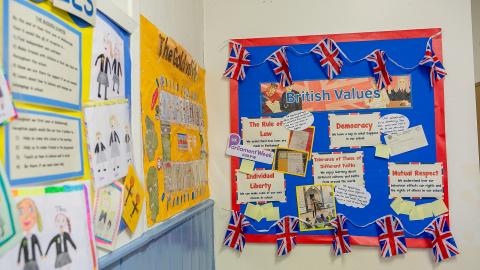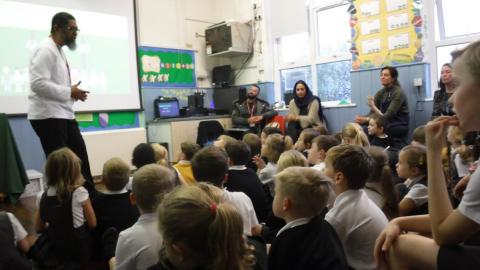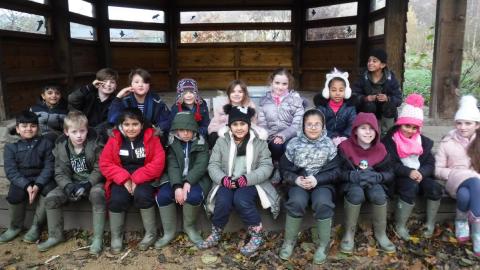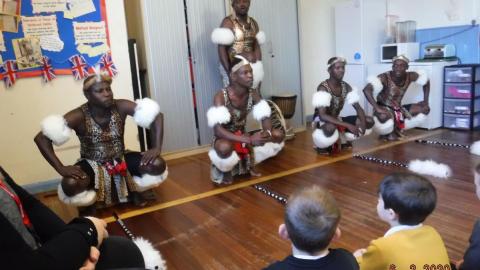Promoting Fundamental British Values
At Goldsborough C.E. and Sicklinghall C.P. Schools, we promote British Values throughout the entire school curriculum and within extra-curricular opportunities.
British Values, recognised by both Ofsted and the Department for Education (DfE) and following government guidelines, are:
- democracy;
- individual liberty;
- the rule of law;
- mutual respect; tolerance of those with different faiths and belief.
Below, each value is defined and is accompanied by a description of how the value is taught in our schools:
Democracy
Democracy can be seen as equality of rights and privileges. It can also refer to our nation’s electoral systems.
In school we promote the importance of democracy through:
1. The free and fair electoral process for leadership positions for School Council, Prefect and Ambassador positions.
2. Regular opportunities to explore the children's perceptions through 'Pupil Voice'.
3. Teaching about Elections and the electoral process of our country’s political system in KS2 with the School Council process being rooted in this systematic and fair approach.
4. Pupils develop their debating skills on key moral topics at an age appropriate level.
5. Key decisions are taken democratically to highlight to our pupils how groups can work together to make fair decisions. Pupils regularly write to the Headteacher to make requests.
6. Y6 Pupils write to, and have meetings with our local MP.
Rule of Law
Rule of law It is expected that while different people may hold different views about what is ‘right’ and ‘wrong’, all people living in England are subject to its law.
In school we promote the importance of the rule of law by:
1. Following a shared set of rules that everyone is expected to follow; these were adapted and then agreed by School Council.
2. Staff work closely alongside partnership with parents and carers to develop a clear sense of right and wrong in our pupils. Further to this, staff use the language rooted in emotion coaching to help children to understand the impact of their actions and when to make changes to improve this.
3. Following a clear and consistent policy rooted in SEMH values, focusing on developing positive relationships, seeing behaviour as a form of communication.
4. Talking pupils through their emotions and feeling, using a ‘restorative’ approach when dealing with behaviour incidents, particularly where there is seen to be a ‘victim’ (e.g. for an instance of name calling).
5. Working closely with our community and encouraging links with, and visits from ‘people who help us’, including Police Officers, to provide pupils with an understanding of national laws and how they are upheld.
Individual liberty
Individual liberty suggests the free exercise of rights generally seen as outside Government control.
In school we promote the importance of individual liberty by:
- Planning the provision of extra-curricular activities and clubs to enable pupils to develop skills and interests independently of the school curriculum.
- Ensuring that pupils’ views and contributions are valued in all classes and by all staff.
- Promoting communication and facilitating opportunities for pupils to voice their views and opinions in lessons.
- Allowing pupils to manage aspects of the school day, such as organising and arranging equipment in playtime boxes, or setting up and leading Collective Worship.
- Embedding specific projects into the curriculum to enable pupils to lead initiatives based on their own interests e.g. the Enterprise German Christmas Market.
- Carefully plotting the provision offered during Collective Worship to celebrate difference and diversity; this is followed up in classroom PSHE and Well-being lessons.
- Pupils take part in visits to a link school in Bradford to deepen their understanding of different ways of living in modern Britain and also participate in an annual visit from pupils from a school in Thailand.
Mutual respect
The proper regard for an individual’s dignity, which is reciprocated.
In school we promote the importance of mutual respect by:
- Ensuring that Respect forms a key part of our ethos and daily provision.
- Having a weekly Ethos Statement linked to the Church Values which develops the children's philosophical and reflective nature.
- Involving pupils in outlining the School Rules.
- Embedding Spiritual, Moral, Social and Cultural learning throughout the whole curriculum which promotes equality and respect for all.
- All staff using the language of Emotion Coaching to support children and resolve conflict.
- Having an Equal Opportunities Policy.
- Having a robust and progressive RE curriculum which supports children with learning about a range of faiths and faith traditions, promotes visiting places of worship and provides opportunities for pupils to meet carefully selected faith leaders in our school setting.
- Outlining aspects of British history in the curriculum that develop the children's understanding of the sacrifices made by our ancestors to result in our current freedoms. We mark Remembrance Day annually through the preparation of a whole school service in the playground and by visiting the War Memorial in the village.
- Pupils in Upper Key Stage Two take the lead in promoting key values to younger pupils. This includes monitoring and promoting high standards of behaviour and respect at lunchtimes, where family service forms a key part of our strategy.
- Pupils are given the opportunity to represent their school in various sporting tournaments, at which sporting values are celebrated.
- Each Friday, there is a Celebration Collective Worship at each school where children are awarded Star of the Week by their Teachers, one special Star of the Week is also chosen by and presented by our Prefects; and, other certificates are awarded to celebrate effort and the times when children have demonstrated Kindness or Resilience for example.
Tolerance of Those with Different Faiths, Religions and Beliefs.
A fair, objective, and permissive attitude to those whose faith and beliefs may differ from one’s own.
In school we promote the importance of tolerance of those with different faiths and beliefs through:
- Observance and specific teaching of a range of religious festivals.
- Acceptance of different faiths and faith traditions.
- Religious Education taught to all pupils weekly.
- Governance includes faith representatives from the Church of England.
Spiritual, Moral, Social and Cultural Development (SMSC)
Goldsborough C.E. and Sicklinghall C.P. Schools both provide Spiritual, Moral, Social and Cultural development (SMSC) throughout the curriculum and this also includes the incorporation of British values by:
- Enabling pupils to develop their self-knowledge, self-esteem and self-confidence.
- Enabling pupils to distinguish right from wrong and to respect the civil and criminal law of England.
- Encouraging pupils to accept responsibility for their behaviour, show initiative, and to understand how they can contribute positively to the lives of those living and working in the locality of the school and to society more widely.
- Enabling pupils to acquire a broad general knowledge of and respect for public institutions and services in England.
- Encouraging further tolerance and harmony between different cultural traditions by enabling pupils to acquire an appreciation of and respect for their own and other cultures.
- Encouraging respect for other people.
- Encouraging respect for democracy and support for participation in the democratic processes, including respect for the basis on which the law is made and applied in England.





